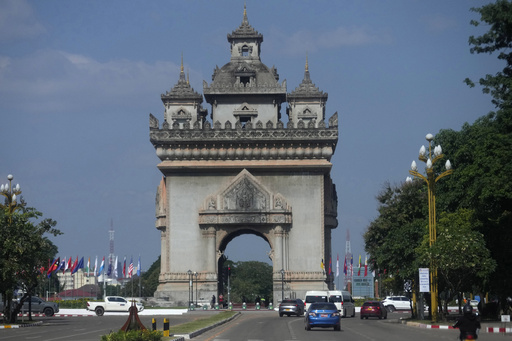
VIENTIANE, Laos — On Wednesday, defense leaders from Southeast Asia converge in the Laotian capital for vital security discussions amid escalating maritime tensions with China in the Asia-Pacific region, alongside the impending transition to a new U.S. presidency.
Secretary of Defense Lloyd Austin is participating in the Association of Southeast Asian Nations (ASEAN) defense ministers’ meetings in Vientiane, where there is considerable anticipation regarding the implications of President-elect Donald Trump’s return to office in January. Recently, Austin concluded discussions in Australia with officials and Japan’s defense minister, emphasizing their firm support for ASEAN and voicing serious concerns about provocative actions in the East and South China Seas, particularly regarding China’s interactions with vessels from the Philippines and other coastal nations.
In addition to the U.S., key participants in the two-day ASEAN meetings include Japan, South Korea, India, Australia, and China. The Philippines, along with Vietnam, Malaysia, and Brunei, are among the ASEAN nations asserting their claims against China’s expansive territorial assertions in the South China Sea, an area that Beijing seeks to control almost entirely.
The remaining ASEAN members comprise Indonesia, Thailand, Singapore, Myanmar, Cambodia, and Laos. Over recent years, China has adopted a more assertive posture regarding its territorial claims, leading to prolonged negotiations among ASEAN nations and Beijing to establish a code of conduct aimed at regulating conduct in the contested waters. Despite ongoing discussions, progress has been slow.
Officials have set a target to finalize the code by 2026, but negotiations face challenges, particularly over whether this agreement should be legally binding. Philippine President Ferdinand Marcos Jr. has urged for expedited discussions, expressing concerns at a recent ASEAN summit regarding ongoing harassment and intimidation from China, which he asserted contravenes international law.
This year has seen multiple confrontations between Chinese and Philippine vessels, and in October, Vietnam accused Chinese forces of attacking its fishermen in contested waters. China has also dispatched patrol ships to regions claimed as exclusive economic zones by Indonesia and Malaysia.
During last month’s ASEAN leaders meeting, U.S. Secretary of State Antony Blinken voiced grave concerns over China’s unlawful and perilous activities in the South China Sea, which he noted had resulted in injuries and harmed vessels from ASEAN countries. He reaffirmed the U.S. commitment to ensuring freedom of navigation and overflight in the Indo-Pacific region.
In response, Chinese Foreign Ministry spokesperson Mao Ning characterized the military presence of the U.S. and other non-regional nations as the primary cause of instability in the area. Mao stated that the escalation of military deployments and operations by the U.S. and certain other countries is exacerbating tensions and confrontation, ultimately threatening the peace of the South China Sea.
The response of the upcoming Trump administration regarding the situation in the South China Sea remains uncertain. Following Austin’s discussions in Australia, a statement from the Defense Department indicated a consensus among the U.S., Australia, and Japan to enhance collaborative military exercises in the region and to establish a defense consultation framework to bolster their joint efforts.
While in the Philippines, Austin refrained from speculating about the continuation of strong U.S. defense support for the nation under Trump. Furthermore, it is not clear if Austin will rendezvous with China’s Defense Minister Dong Jun during the ASEAN meetings; however, reports suggest that Japan’s Defense Minister Gen Nakatani is set to meet with Dong to address concerns regarding Beijing’s military activities.
Japan recently protested an incident in August where a Chinese military aircraft allegedly violated its airspace, and expressed serious concerns following the passage of a Chinese aircraft carrier and destroyers near two Japanese islands in September.
The discussions within the ASEAN forum are expected to include not only the ongoing tensions on the Korean Peninsula but also the war in Ukraine and the rising issues in the Middle East. Topics will likely extend to a variety of matters, including natural disaster responses, cybersecurity issues, and terrorism challenges.
Another pressing security problem in the region is the civil war and worsening humanitarian crisis in Myanmar, an ASEAN member. The credibility of the organization has faced significant strains due to the situation in Myanmar, where a military junta overthrew an elected government in 2021 and has been engaged in ongoing conflict with pro-democracy guerrillas and ethnic insurgents. After more than a year of escalated fighting initiated by three militias, estimates suggest that less than half of the country remains under the control of its military rulers.
Since late 2021, Myanmar’s military leaders have been barred from ASEAN meetings; however, high-ranking bureaucrats from the country have participated in this year’s activities, including the recent summit in October.
